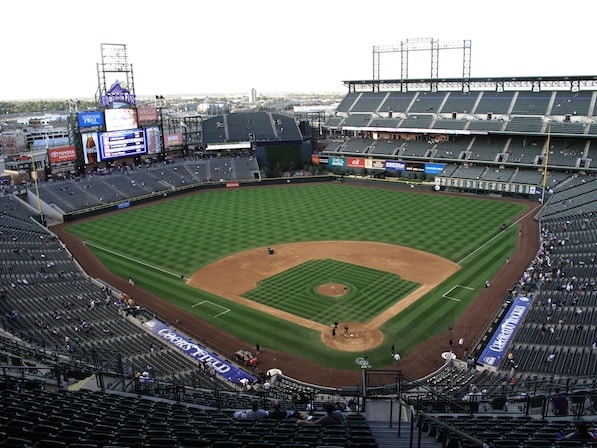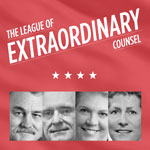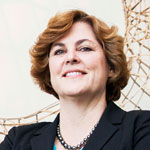What’s a professional athlete to do when he’s done playing the sport? It’s a question often either left unanswered, or relegated to queries from obscure sports biographers and late-night TV profiles. But in the case of Greg Feasel—former professional football player and current COO of the Colorado Rockies—the story is still being written.
Feasel was born in 1957 and raised in Barstow, California, a small town of 13,000 roughly two hours northeast of Los Angeles, seated in the arid Mojave Desert. After not playing a down of football his junior or senior year of high school, Feasel went on to play at his hometown’s junior college before playing at Abilene Christian University in central Texas. From his high school size of 6’3” and 185 pounds, Greg grew into a 6’7”, 300-pound offensive tackle and attended tryouts and training camps with the Seahawks, Eagles, and Houston Oilers, in ’81, ’82, and ’83, respectively. Feasel then made his professional debut in 1983 with the Denver Gold in the USFL, where he stayed for three years. He then went on to play with the Packers, was traded to the Houston Oilers, and concluded his career, in 1987, with the San Diego Chargers.
Feasel has since served as the president of the NFL Alumni Association’s Colorado chapter and been inducted into the ACU Hall of Fame—both events that have served to complement his years in the NFL. Through it all, he’s always had his eye on what would come after his career as a professional football player, because, really, who can play football forever? “I was one of those players that was long on effort and was fortunate to play at the professional level,” he says. “I had some injuries in college, so I wasn’t drafted. Based on the nature of the game and the career expectancy of players, I knew it was going to be a short-term proposition. So, every off-season, I spent some time experimenting in different industries.”
Feasel’s college background was in education, and in one of his first off-season windows, he started studying for his master’s degree and did some assistant coaching. The real turning point for Feasel came when he met with a career counselor. Recognizing that Feasel had done everything from paper routes to working for an ice company in Barstow during summer college breaks, the counselor recommended sales as a possible track for Feasel, encouraging him to test the waters and see if that’s what he would want to do as a career.

Heeding his counselor’s advice, Feasel, who was in Denver at the time, spent three months in the off-season selling cars. “I had some success at it, too, but I knew it was not something I saw myself doing for an extended period of time,” Feasel says.
Thus encouraged that he was heading in the right direction, Feasel then went to work on acquiring a real-estate sales and broker’s license, but found it was difficult to build a strong client base by relegating his sales efforts to off-season windows. “If you’re not in the market, and you’re not talking to people every day, you’re starting over from scratch every year,” Feasel says.
Out of these job experiments, Feasel developed an ethic of person-to-person connectivity, notably that if you give people what they want first, they will give you what you want. This philosophy forged Feasel’s transition from sports to business—a transition aided by an offer from Coca-Cola Enterprises, in October of ’88. The job brought Feasel back to Denver, where he owned a home, and though he started at an entry-level position, within eight years he advanced to become the division director of sales and marketing. “Working at CCE was a great learning experience—business 101—managing the P&L, marketing, sales, distribution, product inventory, and fleet management,” Feasel says. “My first job was driving a truck, but I was moved up the ranks from a district manager to managing a small branch before I started overseeing the Denver market.”
Feasel was one of the parties responsible for forging a 1991 sponsorship agreement between Coca-Cola and the fledgling Rockies—a partnership Feasel is proud to see continuing 20 years later. When the Rockies then began play in the 1993 season, Feasel continued to work with them—and his other prestige accounts—until 1996, when a position for vice president of sales and marketing opened with the Rockies organization. “The Rockies were looking for someone with both a sports and a business background,” Feasel says. “What I was doing with Coca-Cola was different on the surface than what I would be doing with the Rockies, but at the end of the day, it was still treating people the way you want to be treated.”
It was this point that sold both Feasel and the Rockies on his new assignment, which he began in 1996. Feasel reminisces about the pre-Internet and -cell-phone days of that era, when the Rockies relied on person-to-person connections to ensure the nascent vitality of the enterprise.
Professional sports have since had to evolve, due to fan expectations, technology, and more, requiring executives like Feasel to be very structured and detailed. As sports relate to economic and community development, Feasel sees this transformation positively. “Everything moves at the speed of light—everyone wants things now,” Feasel says. “The challenge is for all of us to keep pace with everything while moving the business forward.”
Despite the increasing pace of the world, Feasel paints a picture of going to enjoy a game with friends, buying a hot dog, drinking a beer (Coors or Coors Lite, in the case of the Rockies), and enjoying the pace. Baseball, for Feasel, has always been a
social experience. And though he now treats baseball as a business, it’s a sport first, which Feasel—an athlete by nature—has made the ethos of his trade. “When I played, the business of sport was totally different,” he says. “From my point of view, it seemed to be all about the on-the-field product. Where it sits now, all areas of a franchise must function efficiently and effectively for an organization to win on and off the field.”
It is with his community in mind that Feasel continues to write his story. This year marks Feasel’s 18th year with the Rockies, and his third as the team’s COO. But Feasel also takes his work outside of the park seriously; he serves as a board member for the Denver Civic Ventures Board, the Denver Hispanic Chamber of Commerce, VISIT DENVER (Visitors and Convention Bureau), and the Sports and Entertainment Management Advisory Council for the University of Colorado—and is even the executive director of the Colorado Rockies Baseball Club Foundation. “These are the people we live and work with. Doing all of this is a way to give back and be a part of the community,” Feasel says, emphasizing the importance he places on people being and staying connected. After all, that’s what sports are really about.

